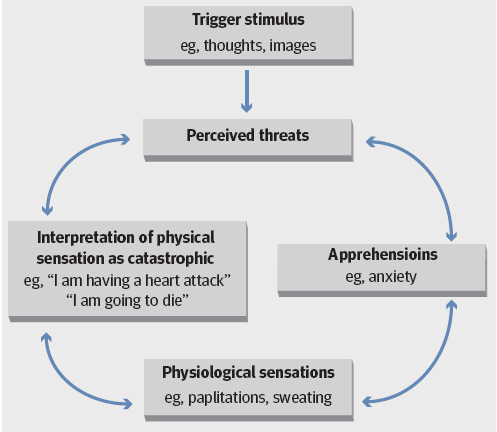
How to calm yourself while having a panic attack? What are the best tips for managing panic attacks? How do I overcome panic disorder?
Panic attacks usually start with shortness of breath or difficulty breathing, so if you focus on breathing slowly in and out, it may be easier for you to stay in control of the situation. To start feeling in control of your anxiety , make an appointment with your doctor and get a full physical exam. Anxiety can cause you to breathe very quickly, which makes both the mental and physical symptoms of. The best way to begin managing your panic attacks is to start building a toolbox of strategies that you can use to help manage them. However, it is important to remember that panic attacks are fairly common and that they are not dangerous.
Therefore, the goal is not to eliminate panic attacks , but to learn to manage them without fear. When you engage in this type of breathing, your belly. You can use an index card or piece of paper, write down some realistic thoughts, and carry them around. Panic attack breathing is an important first step, but your ability to cope with life events is also going to play a role.
The path to overcoming panic attacks requires responses that are quite different from what you usually do. Physical activity lowers stress, which is one of the main causes of panic attacks. A workout, especially the kind that gets your heart pumping, can also get you to a calmer place.
Relaxation breathing techniques can be of great help for coping with panic attacks. The same bodily mechanisms that promote faster breathing rates also cause the body’s muscles to tense up in the face of fear. What to do (and carry with you) to cope with.
Coping with panic attacks and anxiety is made easier if you can approach the problem from several different angles – and that’s what this site is all about – trying to make it as easy as possible for you and covering all the areas that will assist you in your recovery. Panic Attacks Panic attacks can be experienced on their own or in combination with another anxiety or mental health condition. Many people can experience panic attacks and have generalized anxiety disorder, which can make managing it difficult. This type of therapy can help you identify patterns and triggers of your panic attacks. During these sessions, you will learn how to cope with the feelings of anxiety and physical symptoms associated with the attacks.
Fortunately, it is possible to overcome panic attacks. The steps involved in overcoming panic include understanding exactly what happens when you do panic , learning to change the catastrophic thoughts that drive your panic attacks an as you become more confident, slowly confronting the situations that have caused you to panic. Find out how I cope with Agoraphobia, Anxiety, and Panic Attacks on a daily basis. Anxiety Simple Tactics to Manage Anxiety and Panic Attacks Tips on what to do when a panic attack hits and how to manage chronic anxiety.

People who experience panic attacks usually breathe with their chest, but they should breathe from their diaphragms. Breathing techniques help to relieve panic attacks. CBT is a helpful option for people who experience repeated panic attacks. Smell is a sense which can help combat a panic attack.
Lavender oil has been confirmed as ‘effective’ in dealing with anxiety. Accept the panic attack for what it is and let the feelings wash over you. Remember, it is only temporary, and it will fade eventually. In a panic attack, the changes are physiologically indistinguishable from the stress response but serve no useful function since there is no real danger.
Since the symptoms of a panic attack can be intense, they can also be very frightening. A friend gave me the best advice for worrying about sleep. Always take a drink of water with you to bed.
The reason is, you can not die if you are drinking. A panic attack wont kill you, we already hear this each time we talk to the GP. The water just proves that theory really.
To cope with plain-vanilla anxiety, get real, as they say. If you start to panic , sip the water. Separate out the real risks and dangers that a situation presents and those your imagination is making worse, advises Ross.
No comments:
Post a Comment
Note: Only a member of this blog may post a comment.